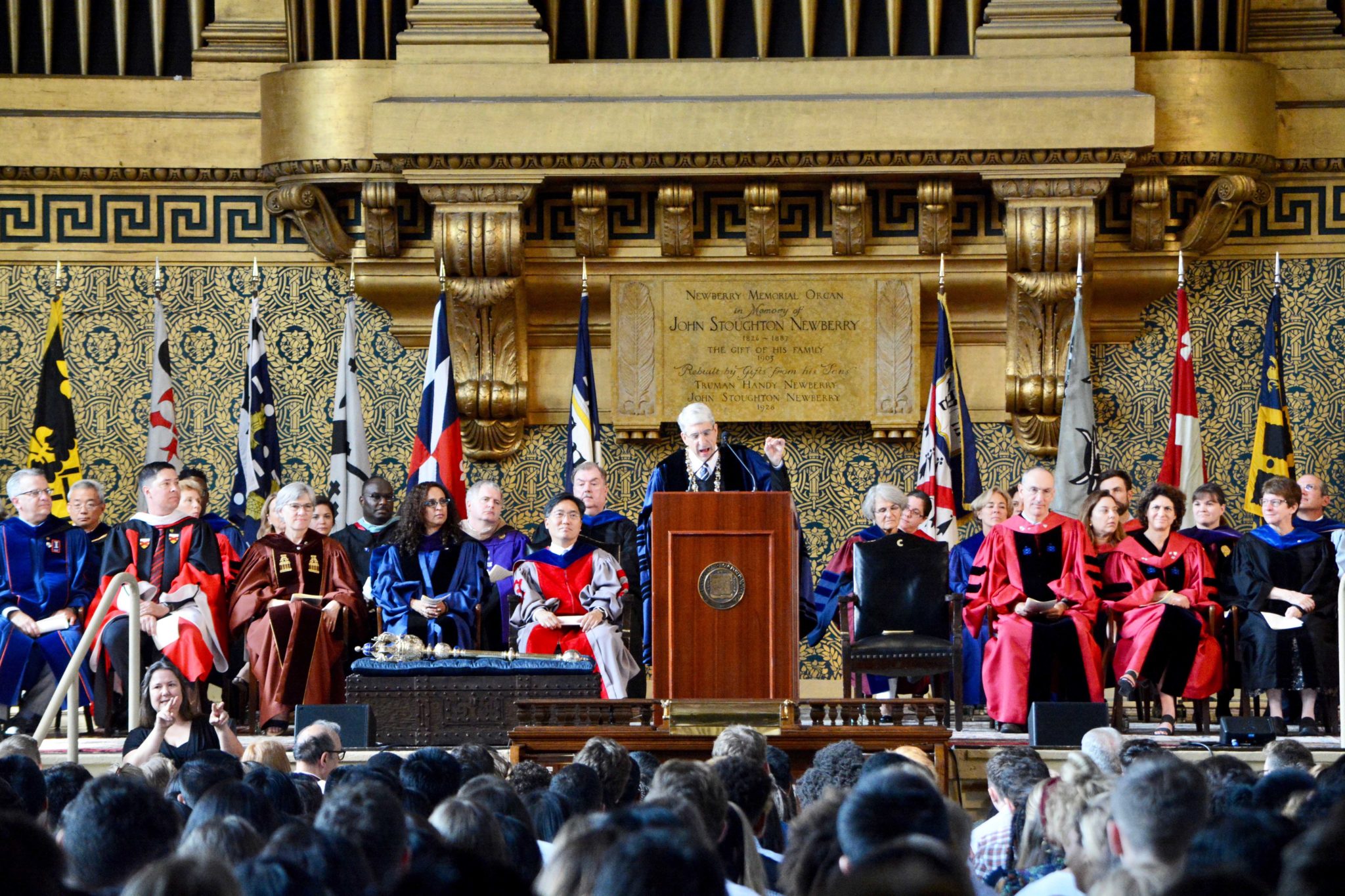
“For God, for Country, and for Yale!,” sang University President Peter Salovey, a bit off-key.
He prefaced the performance with the caveat that he is a bluegrass bass player, not a singer.
On Saturday morning, Salovey carolled Yale’s unofficial alma mater from the stage of Woolsey Hall in his sixth Yale College Opening Assembly Address. In his speech, he emphasized that the first-year students who filled the auditorium have a central commonality: they are all “citizens of Yale,” a characteristic they share irrespective of national origin.
Salovey used the address to underscore his commitment to advocate for immigration policies that allow the University to recruit students and scholars from around the world. He stressed that education and research at Yale require the free movement of people across national borders.
“In our country and our world today, questions about citizenship and immigration are hotly contested,” he said. “But at Yale, we share none of this uncertainty about the critical importance of immigrant and international students and scholars.”
University officials have historically used the opening address to discuss social and political debates at Yale and in higher education more broadly. In Salovey’s first-ever opening address in 2013, he spoke about socioeconomic mobility and the American Dream, recounting the story of his own family’s rise from poverty.
In his address in 2015, in the wake of the shooting of African-American churchgoers by a white supremacist in Charleston, South Carolina, he called for a campus-wide discussion about the contentious namesake of Calhoun College. After 18 months of debate, Yale ultimately renamed the college in honor of Grace Murray Hopper GRD ’34, a pioneering computer scientist.
Immigration has long been a personal issue for Salovey, who has repeatedly cited in speeches and interviews the story of his own grandparents, who immigrated from Warsaw, Poland and Jerusalem to the Bronx. Last year, as news spread that President Donald Trump would roll back the Deferred Action for Childhood Arrivals program, Salovey penned emails and a public letter to Trump, expressing his support for the program and urging the president to maintain the policy.
This summer, immigration policy once again sparked national debate as the Trump’s administration implemented a controversial “zero tolerance” crackdown at the border that led to thousands of family separations. And in late June, the Supreme Court upheld Trump’s travel ban, which restricts entry to the United States by citizens of eight countries, six of which are majority-Muslim.
Salovey did not explicitly mention either political controversy in his address. But before the Supreme Court decision, the University had jointly filed three amicus briefs opposing the travel ban, which the University argued restricts its ability to attract international students and faculty members.
In the speech, Salovey also invoked his personal history to illustrate historical changes at Yale.
When Henry Durand, class of 1881, coined Yale’s alma mater, the University was far different than it is now, he said. Until recent decades, he continued, most Yalies were white, Protestant, and American. Salovey, who is Jewish and received a doctorate in psychology from Yale in 1986, said he would have been much less likely to be admitted to Yale a century earlier, when the University had strict quotas for the number of Jews it would admit.
Dean of Yale College Marvin Chun, who spoke before Salovey, instructed the first years to embrace the differences among them and be wary of confirmation bias. To illustrate his point, he had flyers distributed that included an image of an animal that resembled either a duck or a rabbit, depending on the perspective from which it was viewed.
First years interviewed after Salovey’s speech said they appreciated that the president used his address to emphasize a sense of community and belonging among students.
Brian Sleeva ’22 said he was impressed that Salovey managed to discuss the role of immigration on Yale’s campus without politicizing the issue.
And Ariana Habibi ’22 said it was important that Salovey emphasized that Yale is a home for all, given the importance of issues like immigration to international students and students of color.
“It was important to lay that out and say that this space is an inclusive one,” said Elaina Foley ’22, echoing that point.
In the fall of 2017, 2,841 international students from 121 countries were enrolled at Yale.







